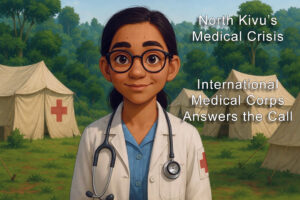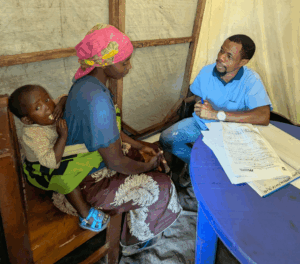Medical teams race to contain the deadly virus in hard-to-reach Kasaï province as healthcare workers fall victim to disease that has claimed 16 lives among more than 20 confirmed cases.

A new Ebola outbreak has emerged in the remote Bulape health zone of the Democratic Republic of Congo (DRC), marking the 16th occurrence of the deadly virus in the country since 1976. The outbreak, officially declared by the Ministry of Health on September 4, has already claimed 16 lives among more than 20 confirmed cases, with several healthcare workers among the victims.
The epidemic began with a pregnant woman who arrived at Bulape General Reference Hospital on August 20 displaying the characteristic symptoms of high fever, bloody diarrhea, and severe weakness. She died five days later from multiple organ failure. Two healthcare workers who treated her subsequently developed similar symptoms and also died.

“Our teams began supporting the General Referral hospital in Bulape almost immediately,” said Brice de le Vingne, emergency coordinator for Médecins Sans Frontières (MSF). The medical humanitarian organization quickly mobilized alongside the World Health Organization to establish an Ebola treatment center within the hospital compound, which began admitting patients on September 9.
The outbreak presents significant challenges due to its location in one of Congo’s most isolated regions. The area suffers from poor road conditions, lacks a cargo airport, and has limited electricity infrastructure—factors that complicate the emergency response. Population movements between Bulape and the provincial capital Tshikapa, located 100-200 kilometers away, raise concerns about potential spread.
Laboratory testing has confirmed that this outbreak represents a new zoonotic spillover event, unrelated to previous outbreaks in the region. The virus belongs to the Zaire strain of Ebola, the same variant responsible for the devastating West Africa epidemic of 2014-2016.

Medical teams have moved swiftly to contain the outbreak. An Ebola treatment center now operates within the Bulape hospital, providing specialized care to suspected and confirmed cases. Healthcare workers receive training in infection prevention protocols, while contact tracing efforts work to identify and monitor individuals who may have been exposed to the virus.
The WHO has made 2,000 doses of the Ervebo vaccine available, with additional shipments expected. The vaccine, administered through a “ring vaccination” strategy, targets contacts of confirmed cases and frontline healthcare workers most at risk of exposure.

“This outbreak is a reminder of the threat posed by Ebola in the DRC,” said Hilde De Clerck, MSF infectious diseases specialist. “Fortunately, progress in recent years has led to improved treatments, but this haemorrhagic fever can still be fatal for most infected patients without timely and appropriate care.”
The current outbreak occurs against a backdrop of multiple health crises in the DRC, including ongoing mpox, cholera, and measles outbreaks. The country’s limited resources and capacity are stretched thin across these simultaneous emergencies.
This marks the first confirmed Ebola outbreak in the Democratic Republic of Congo since August 2022, when a single case was reported in North Kivu province. The Bulape region last experienced an Ebola outbreak in 2007, which MSF also supported.
As medical teams work to expand surveillance and treatment capacity, the focus remains on preventing the outbreak from spreading beyond the affected health zones. Early detection, isolation of cases, and comprehensive contact tracing represent the primary tools for containing the virus before it can establish wider transmission chains.
WHO currently assesses the public health risk as high at the national level, moderate regionally, and low globally, reflecting both the outbreak’s current geographic containment and the proven effectiveness of established response protocols when rapidly implemented.
This summary is based on these two articles:
- DRC: MSF supports Ebola outbreak response in Kasaï, by MSF
- Disease Outbreak News: Ebola virus disease – Democratic Republic of the Congo, by WHO
Related Articles

A Standout Voice Against Polio
For 25 years, Marguerite has walked the streets of Kisangani, DRC, calling on families to protect their children. From UNICEF.

North Kivu’s Medical Crisis: International Medical Corps Answers the Call
Before International Medical Corps’ mobile health clinics arrived in Kirotshe, affordable healthcare was out of reach for families in that region of the Democratic Republic of the Congo (DRC). Today, these teams now deliver lifesaving medical care and humanitarian aid where no one else goes—navigating washed-out roads to reach rural communities.

North Kivu’s Medical Crisis: Answering the Call
Before International Medical Corps’ mobile clinics arrived in Kirotshe, affordable healthcare was out of reach. Today, these teams deliver lifesaving care where no one else goes—navigating washed-out roads to reach rural communities.
